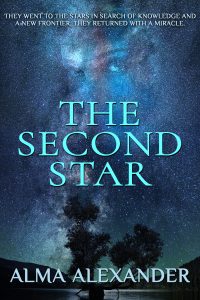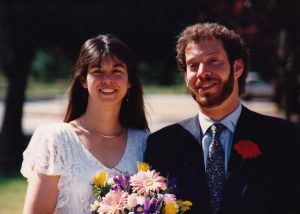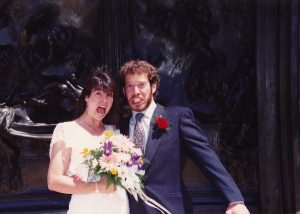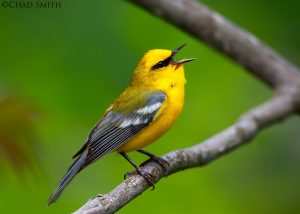Many of you know that I have a Ph.D. in U.S. History. My years of studying America’s past have taught me a lot and left me fully aware of the dangers inherent in making broad, sweeping generalizations. And yet…
I believe our nation is failing so completely in combatting Covid-19 at least in part because we, as a society and as a nation, are not capable of doing what we must to succeed. The ethos of American culture, such as it is, revolves around “individualism” and “personal liberty,” values that are fundamentally antithetical to communal sacrifice and collective thinking. The pandemic was bound to hit us hardest, because we are not wired for the sort of social solutions needed to combat it.
Right now, the United States, which accounts for about 4% of the world’s population, has seen approximately one quarter of all reported cases and deaths worldwide. Yes, there are legitimate questions about the accuracy of the figures released by a few other countries, but there can be no doubt that the U.S. is faring far worse against Covid-19 than it should, and far, far, FAR worse than the countries we consider our peers and closest allies. Some of the blame for this falls squarely on the Trump Administration, whose response has been scattershot, ineffective, and deeply irresponsible. Some of the blame falls on local politicians, who have parroted Trump’s denials and lies. Some of the blame can also be tied to the size of the United States, and the diffuse nature of our various levels of government.
But that is also where we start to see the impact of our obsession with “liberty.” Months ago, the Federal Government should have issued an order requiring the use of face masks in all public places. But many state leaders would have screamed bloody murder at such “Federal overreach.” Localities, they would argue, ought to have the final say in what sort of dictates are imposed on their citizens.
Unless those dictates are deemed too onerous by the Liberty Junkies. Brian Kemp (Moron — Georgia) has sued the mayor of Atlanta, Keesha Lance Bottoms, and the Atlanta city council, because they dared to issue a mandatory mask order, in violation of his ban on such orders from all localities in the state. Kemp claims to believe that people ought to wear masks, but he is adamantly opposed to making this mandatory. Similar debates are taking place all across my state of Tennessee. A coalition of doctors here asked our governor, Bill Lee (Spineless — Tennessee), to issue a mask mandate. He refused, instead authorizing county mayors to issue such directives if they so choose. Too many have chosen not to, including one who said explicitly, “We were debating masks when we should be discussing liberty, freedom, and personal responsibility.”
I want to ask these people if their belief in personal responsibility extends to driving 100 mph on their county roads, or if their troopers will still be ticketing for that. To my mind there is little difference between speed limits and mask requirements. Experts tell us that filling the roads with drivers who drive at excessive speeds will lead to property damage, injuries, and deaths. Controlling speeds is a matter of public safety. Experts tell us that the spread of coronavirus will be slowed by people wearing masks that protect themselves and others from the spray of infected liquids that results from human respiration and conversation, not to mention coughing and sneezing. It, too, is a matter of public safety.
Will wearing masks prevent all new infections? Of course not. Nor will speed limit laws prevent all accidents. Is it possible that someone not wearing a mask will manage to avoid getting sick and infecting others? Sure, it’s possible. And it’s possible that some asshole driving 97 on a twisty county road will reach home alive. That doesn’t make it a good idea.
The problem is, the Liberty Junkies have never gotten over being nine years old and shouting “It’s a free country!” every time someone tells them to do something they don’t want to do. Honestly, I don’t understand the vehement reaction of mask-wearing. It’s just not that big a deal. Even if it were more onerous, though, that wouldn’t change the essential facts: Wearing a mask makes each of us less vulnerable to the disease. It makes it less likely that we will spread Covid to someone else. And, by keeping us healthy, it also protects our friends and loved ones from subsequent infection. That, to my mind, should be the end of the discussion.
In New Zealand, Australia, Canada, and many European countries, infection rates spiked and then subsided because people took quickly to masking, to social distancing, and to complete and prolonged economic inactivity. And, actually, those steps briefly worked here, too. For just a moment, we had started to get a handle on this thing. The advice of the experts worked. (And, I’ll add, it also didn’t hurt that all of the other countries I mentioned have universal health care coverage, making it easier for the sick to get the treatment they needed.)
But here, too many people still refused to wear masks and to distance, and attempts to close down the economy were met with impatience and outright resistance. It doesn’t help that many in Congress have been unwilling to extend the sort of financial relief that would make a lengthy economic shutdown less destructive. That’s part of the American obsession with individualism as well. As a nation, we don’t want “socialized” anything. We don’t want to give people “handouts,” even when such benefits are precisely what circumstances demand. Because somehow catering to the public welfare in such a way is equated with “weakness” and moral turpitude.
Lots of factors have contributed to our country’s disastrous response to the pandemic, and I believe the Trump Administration bears much responsibility. But I would argue as well that Trump and his lackeys couldn’t get away with their demonization of experts and their rejection of masks and other simple, proven methods to contain the virus, if our national culture didn’t make such tactics so easy. For too long, we have idolized America’s “rugged individual” and fetishized “personal freedom.” Is it any wonder that so many in this nation find it perfectly acceptable to ignore the common good?









 1. As we begin, please tell us about The Second Star. What is it about? What are its major themes?
1. As we begin, please tell us about The Second Star. What is it about? What are its major themes? It’s Memorial Day – and, it seems to me, a particularly somber one at that – and so I won’t write too much for today’s Musings.
It’s Memorial Day – and, it seems to me, a particularly somber one at that – and so I won’t write too much for today’s Musings. But we did everything we could to keep costs down. Because we were students at the school, Stanford allowed us to marry in the Rodin Sculpture Garden, near the university museum, for something like $200. It was a gorgeous venue — we have joked since that we were married in front of the Gates of Hell, because, well, we were. We had our reception at a reasonable local restaurant – part of a Bay Area chain called, I kid you not, the Velvet Turtle. Not amazing, but decent food and lots of it. We hosted a party the night before the wedding at our apartment, and then did the same for brunch the day after the wedding. Our big activity? On Saturday afternoon, after the rehearsal lunch, we had a softball game for the entire guest list – whoever wanted to play. (We played a lot of softball in grad school – her bio lab had an intramural team.) The game was bride’s team against the groom’s team (randomly selected). I have no idea who won. But the two key rules were, 1) Nancy didn’t have to play in the field, and 2) she got to bat whenever she wanted, no matter which team was up. She would just announce, “Bride’s turn to hit!” and then she would…
But we did everything we could to keep costs down. Because we were students at the school, Stanford allowed us to marry in the Rodin Sculpture Garden, near the university museum, for something like $200. It was a gorgeous venue — we have joked since that we were married in front of the Gates of Hell, because, well, we were. We had our reception at a reasonable local restaurant – part of a Bay Area chain called, I kid you not, the Velvet Turtle. Not amazing, but decent food and lots of it. We hosted a party the night before the wedding at our apartment, and then did the same for brunch the day after the wedding. Our big activity? On Saturday afternoon, after the rehearsal lunch, we had a softball game for the entire guest list – whoever wanted to play. (We played a lot of softball in grad school – her bio lab had an intramural team.) The game was bride’s team against the groom’s team (randomly selected). I have no idea who won. But the two key rules were, 1) Nancy didn’t have to play in the field, and 2) she got to bat whenever she wanted, no matter which team was up. She would just announce, “Bride’s turn to hit!” and then she would…